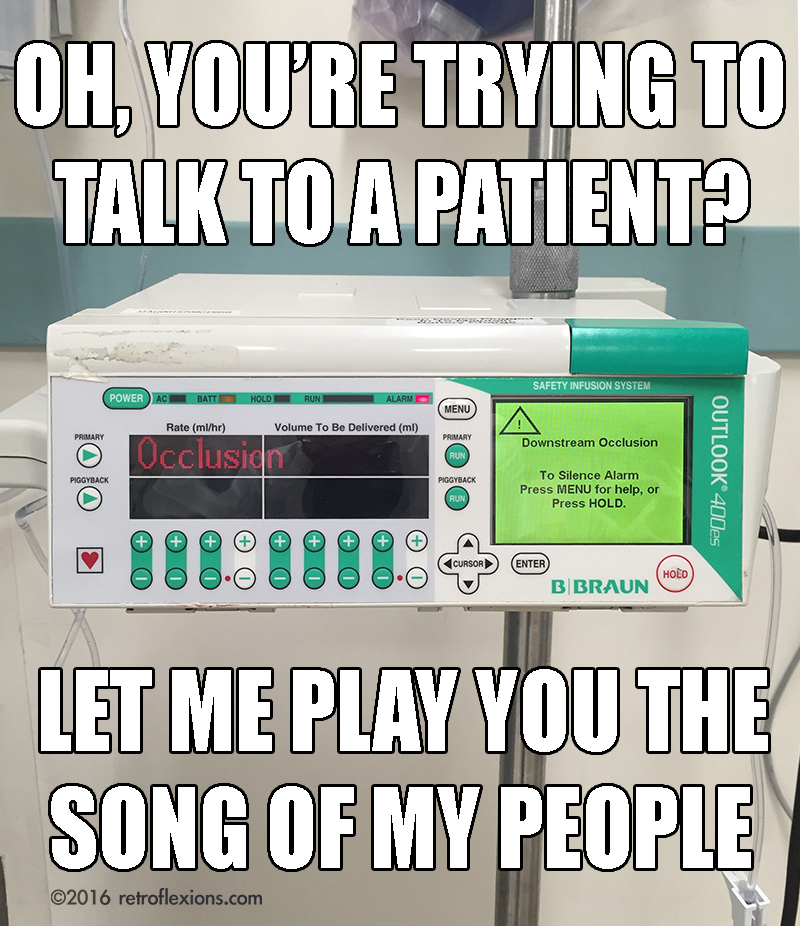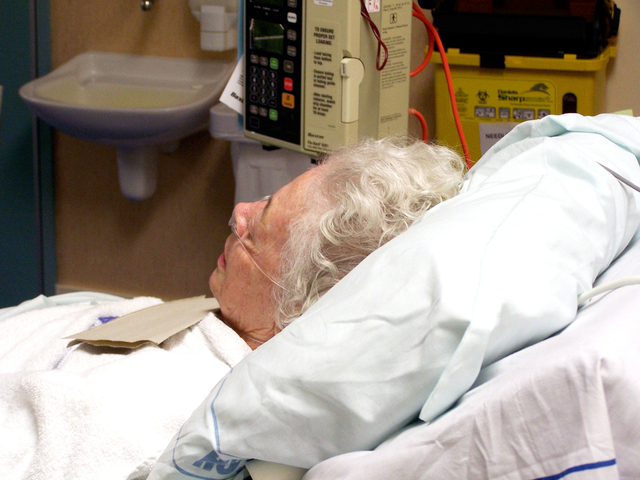Me: Hello Mrs. Smith, my name is [BEEP!] Dr. Gandolfo and I am a [BEEP!] gastroenterologist. [BEEP!] Your doctor wanted me to [BEEP!] talk to you about something that showed up on [BEEP!] your CAT scan.
Mrs. Smith: Who are you? I [BEEP!] didn’t hear your name?
Me (louder): It’s Fred Gandolfo, I am the [BEEP!] stomach doctor. [BEEP!] I need to talk to you about [BEEP!] that CAT scan you had. You see, there was… [BEEP!] [BEEP!] [BEEP!] Can you straighten your arm please?
Mrs. Smith (confused, worried): What’s wrong with [BEEP!] my arm? You’re the doctor for [BEEP!] my arm? This arm has been hurting me [BEEP!] for 35 years, ever since–
Me: [BEEP!] No no no, please straighten your arm so the IV pump will stop [BEEP!] beeping!
Mrs. Smith: Oh, I see.
(Mrs. Smith straightens her arm while I push the “resume” button on the IV pump)
Me: Now where were we? Oh yeah…I’m Dr. Gandolfo. I wanted to ask you about the pain you have been having in the belly. You see, the CAT scan that you just did showed some… [RING-RING!]
Mrs. Smith: What’s that noise? Is that [RING-RING!] my phone? Where is it? [RING-RING!] Oh, here it is, hold on doc… Hello? Beatrice? Listen, I’m with the doctor, let me call you back. Yes, the doctor is here. What? Hold on Beatrice, I’ll ask him…Hey doc, what was your name? He said Gaaan-dolllll-foe. Hold on, what? The CAT scan? I don’t know…nobody’s telling me anything. What? Here…talk to the doctor…(handing the phone to me)…
Me: Please Mrs. Smith, if I can only have five minutes of your time to talk, then I will talk to whoever you want me to…just tell her you will call her right back.
Mrs. Smith: Ok, Beatrice I will call you right back. (hangs up phone) Now doc, what did that CAT scan show?
Me: Well, it looks like you might have–[BEEP!] [BEEP!] [BEEP!]
In every hospital I have ever worked in, from medical school to present day, there is a noise pollution problem of epic proportions. Every medical device seems to emit at least three different types of beeps, each of them being more loud and annoying than the next. IV pumps beep when the patient moves, or when the bag is done, or just for any reason at all. Ventilators beep every time the patient coughs, or gets suctioned, and there is that (actually useful) panic beeping when the ventilator gets disconnected from the patient. Vital sign monitors beep constantly for a variety of reasons, many times when the vitals seem perfectly fine. Telemetry is the worst offender, with constant alarms going off which are approximately 99.8% of the time unimportant electrical noise we call artifact. Beepers beep, phones ring, and intercoms connected to every patients room interrupt any remaining moments of silence with crucial information such as “Whoever paged red team intern, pick up line 2!” or “Transport is here for bed 8!” A one hundred-decibel bed alarm goes off every time a patient deemed a “fall risk” shifts in their bed. It’s no wonder why my ears hurt at the end of the day!
There is a concept known as the signal-to-noise ratio that is useful to understand when thinking about all of these alarms. The signal is the useful information: In healthcare this might be when the patient has a dangerous heart rhythm, or when the ventilator gets disconnected…something important that we don’t want to miss. The noise is everything else. Ideally, the signal-to-noise ratio should be greater than 1, i.e., more signal than noise. However, in reality the ratio is more like 0.1 or less, with most of the auditory input being the equivalent of noise.
This situation creates a condition known as alarm fatigue. In order to remain productive throughout the day, the brain is constantly filtering out the nonsense noises while trying to pick up the alarms when they sound important. In the face of mostly noise, this filtering process begins to think that everything must be noise, and can filter out all the alarms…including the important ones. So in essence, these constant alarms are self-defeating and can make people unconsciously ignore important signals because the brain has the noise filter set to 11.
What is the solution? Beats me. But it seems like the amount of nonsense inputs to my brain are getting worse each year and what is even scarier is that these signals have now mutated across wavelengths into electronic form. Of course I’m taking about the electronic medical record, and all the popup warnings and acknowledgements that serve little use other than to create a nifty electronic record of all possible legal liabilities that the doctor has been notified of, and has decided to proceed anyway. Life-threatening dosage errors and allergy warnings are grouped together with messages that pop up every time I prescribe bowel prep for a patient with GI bleeding, stating that bowel prep is “Warning: contraindicated in gastrointestinal bleeding, severity unknown.”
Too much noise and not enough signal makes for a loud, stressful, unpleasant, and dangerous working environment. The Joint Commission recognized this in 2013 and drafted a plan to combat alarm fatigue that apparently started in 2014 and is ongoing. I will be impressed with their progress when I can hear myself [BEEP!] think…
If you enjoyed this article, sign up for our free newsletter and never miss a post!
First image via freeimages.com/melodi2

